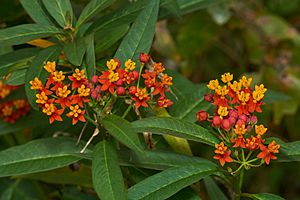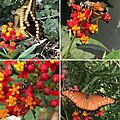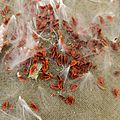Tropical milkweed facts for kids
Quick facts for kids Tropical milkweed |
|
|---|---|
 |
|
| Conservation status | |
| Scientific classification | |
| Genus: |
Asclepias
|
| Species: |
curassavica
|
| Synonyms | |
|
Asclepias nivea var. curassavica (L.) Kuntze |
|
Asclepias curassavica is a special plant often called the scarlet milkweed. You might also hear it called Mexican butterfly weed or bloodflower. It's a type of milkweed plant. This plant is originally from Central America and South America. But now, you can find it growing naturally in many parts of the world. It produces beautiful flowers from spring all the way through fall.
Contents
What is Scarlet Milkweed?
The scarlet milkweed is a flowering plant known for its bright, colorful blooms. It belongs to a group of plants called Asclepiadoideae. These plants are very important for certain insects, especially butterflies.
Why is it Called Milkweed?
If you break a stem or leaf of a milkweed plant, you'll see a white, milky sap. This sap is where the "milkweed" name comes from! This sap can be a bit sticky.
Where Does it Grow?
This plant loves warm places. It started out in the sunny regions of Central and South America. Over time, its seeds traveled, and now it grows in many tropical and subtropical areas around the globe. It can often be found in gardens, fields, and along roadsides.
Flowers and Seeds
The scarlet milkweed has pretty flowers that are usually bright orange, red, and yellow. These colors make them stand out!
Flower Power
The flowers grow in clusters. They are shaped in a way that helps insects like butterflies and bees collect nectar. Nectar is a sweet liquid that gives insects energy. When insects visit the flowers, they also help the plant make seeds. This process is called pollination.
How Seeds Spread
After the flowers bloom, the plant produces long, green pods. When these pods are ready, they split open. Inside, you'll find many flat, brown seeds. Each seed has a fluffy, white "parachute" attached to it. This parachute helps the wind carry the seeds far away, spreading the plant to new places.
A Home for Butterflies
The scarlet milkweed is super important for a famous insect: the Monarch butterfly.
Monarch Caterpillars' Food
Monarch butterflies lay their eggs only on milkweed plants. When the eggs hatch, tiny caterpillars emerge. These caterpillars eat the milkweed leaves to grow big and strong. The milkweed is the only food source for Monarch caterpillars! Without milkweed, Monarch butterflies would not be able to complete their life cycle.
Nectar for Adult Butterflies
Once the caterpillars turn into butterflies, they still visit milkweed plants. Adult Monarch butterflies, and many other types of butterflies and bees, drink nectar from the flowers. This gives them the energy they need to fly and live.
Images for kids
See also
 In Spanish: Flor de sangre para niños
In Spanish: Flor de sangre para niños













